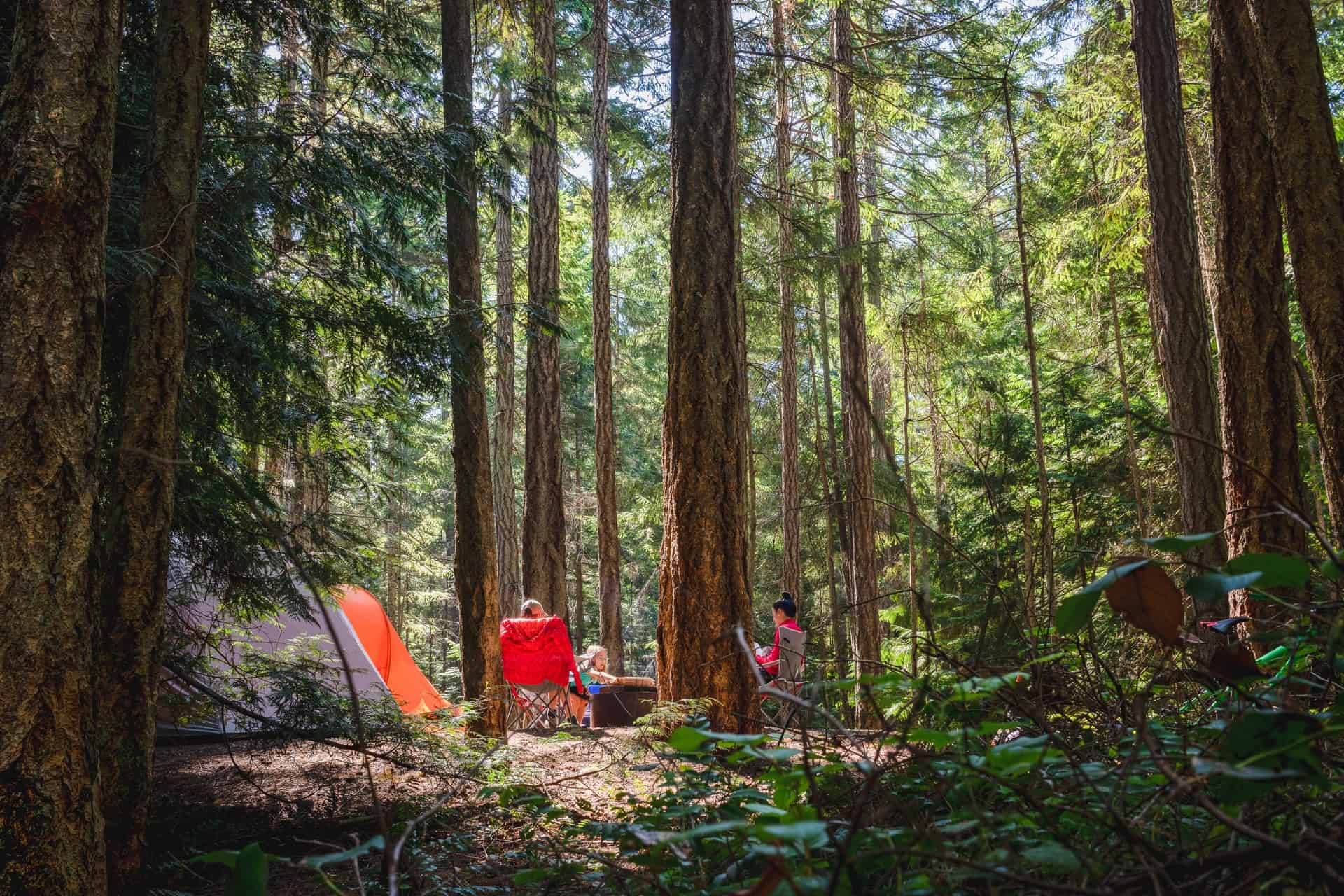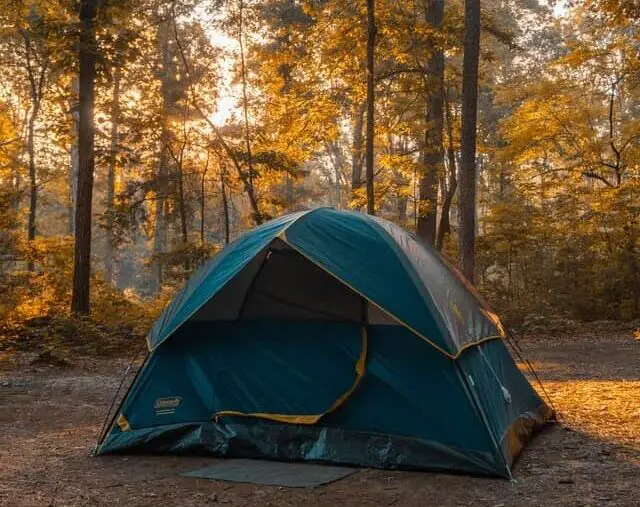Campers everywhere are rejoicing as the short winter days begin to grow longer in anticipation of the summer. Summer is by far the most popular time of year to partake in outdoor activities.
Spending your days exploring the wilderness, lazing alongside a river, and soaking in that deliciously warm sunlight makes summertime the most enjoyable and relaxing camping season.
The summer months can be the most enjoyable for camping. Big, beautiful blue skies combined with comforting warm temperatures and an abundance of plant and animal life can make the woods seem almost magical during the summer. But it does come with some drawbacks.
Also Read: How to Stake a Tent (The Best Ways!)
Why Insulate Your Tent?
There are a lot of bugs during the summertime. Mosquitoes, deerflies, and other biting insects come out in abundance. (Insulating your tent in the winter will help keeping you warm as well!)
There are also sudden, dangerous storms to watch out for during the warmest months of the year. And, sometimes, the heat can become oppressive.

Depending on where you live and camp the temperatures could exceed 100°F and the humidity can give the air a dense, sticky quality that isn’t enjoyable for long.
When you have a love of camping but a low tolerance for extreme temperatures and humidity what do you do?
One option is to insulate your tent! It may sound counterproductive to insulate your tent while camping in the summer. You may be wondering what the point is; after all, insulating your tent will just trap the heat inside, won't it?
Insulating your tent will actually keep all that heat and humidity out. You can also get creative and install an AC unit!
Using an AC unit while camping may seem impossible, too expensive, or too luxurious for camping but it doesn’t have to be. Read on to find out how to insulate your tent in the summer and get some more tips on getting the most out of your summer camping trip.
Materials Matter
Deciding how to go about insulating your tent in the summer or even winter is going to depend on a few different factors but the biggest by far is the material that your tent is made out of.
Most tents designed for camping in the summer are going to be made out of materials that are thin, breathable, and help keep you cool.
Polyester is a common fabric used to make tents. It’s a super lightweight material that doesn’t provide you with much in terms of insulation.
Polyester won't be able to block excess heat from getting into your tent and can actually work against you in warm weather by trapping the heat in with you.
Nylon tents are also pretty common for camping during the summer months. This material has similar benefits and drawbacks to polyester, but it’s more durable. Nylon tents also tend to be more expensive than their polyester counterparts.
The other option many campers opt for in the summer is canvas or cotton tents. These tents aren’t a lightweight option but they do provide significantly more insulation than tents made of synthetic fibers like polyester and nylon.
A canvas tent will help keep you cool on hot days and will be easier to insulate.
How To Insulate Tent for Summer
Insulating your tent for summer is very similar to Insulating your tent for winter.
If you decide to insulate your tent during the summer you should do so with one clear goal in mind. You either want to insulate your tent enough to keep the heat out or to install an AC unit and keep the cool air inside.
Both goals are attainable with little research, work, and the right materials. Something to keep in mind is that insulating your tent will reduce the amount of space you have to move around while inside your tent.
It also means that if you’re going to be hiking and setting up your tent in a different spot each night then you’ll likely need to set up your insulation each night as well.
Also Read: How Long Do Tents Last?
Insulating to Keep Heat Out
After a long day of meandering through the woods, swimming in the river, and hanging out in nature it can be tough to end your day in a hot and humid tent.
No one wants to feel themselves sweating as they try to drift off to sleep. So, how can you keep your tent cool during the summer?
You can insulate your tent to keep it from retaining all of the heat and humidity that those long summer days are going to subject it to. You can use a reflective sunshade as your main outer layer of insulation for your tent.

Reflective sunshades come in all shapes and sizes. Most people are probably familiar with the ones you put inside your car’s windshield to keep your steering wheel and seats cool. But reflective sunshades can be much larger and more flexible than that.
There are reflective tarps specifically made for keeping you cool while camping in the summer. These tarps are big enough to encompass the entire outside of your tent.
Using a reflective sunshade will help to deflect the radiation and UV lights coming from the sun. You’ll find yourself much cooler without those bearing down on your tent.
You’re going to need to keep the inside of your tent insulated as well. Insulating your tent is similar to insulating a house in that you need to make sure you’re covering the walls and the floor with the proper materials.
A good trick is to buy foam with an aluminum layer that you can secure up against the floors and walls. Place the aluminum side against the floor and walls so that it can reflect the heat back out. The foam will help to contain the cooler air inside your tent.
how to insulate a tent for ac Unit
If your goal is to hook up an AC Unit for your tent then it’s going to need to be properly insulated first. You can use all the tips above to get your tent insulated for an AC unit, but you’re going to need to take a few extra steps to get it ready for this purpose.
Once you have your basic insulation in place it’s time to look for leaks. Running an AC unit in your tent isn’t going to be cheap and any place where air can escape will cost you. Luckily, there’s a cheap solution to this problem.
You can cut up a pole noddle and place it where your tent meets the ground to help prevent air from leaking out. If you have a tent that has mesh windows or vents then you’re going to want to add an extra layer of insulation over those.
A simple tent patch would do wonders on those areas or you can simply double up on the insulation you’re already using on the sides and floor of your tent.
Depending on the type of camping you doing you may want to cut down on the number of materials that you’re bringing with you.
Using the same insulation and doubling it over problem areas will help reduce how much gear you’re hauling to your campsite.
Using an AC unit in your tent during the summer may come across as more ‘glamping’ than camping but it can be a necessity for some people
If you’re elderly, have pressing health concerns, or simply want to enjoy camping while fat, then using an AC unit during summer trips is a great option.
Staying Cool
Insulating your tent and using other methods to keep your tent cool in the summer will help you relax and recharge between activities and provide you with a comfortable environment so you can get a good night’s sleep.
But what about staying cool during the day?
Camping during the summer usually involves a lot of activities during the day. Maybe you’ll spend your days exploring trails around your campsite, swimming in a river or lake, fishing, or participating in group events.
It can be disappointing to have to sit out of an activity because the heat is too oppressive and you can feel yourself overheating.
Staying cool during the daytime will help you avoid missing out on the activities you love and that makes your camping trip special.
Hydration
The easiest way to keep yourself cool is by keeping yourself hydrated! A general guideline for water intake while spending time outdoors in high temperatures is 2 liters a day.
But keep in mind that the more you sweat, the more you need to drink. Keep pushing that water to help your body replace the electrolytes you lose while sweating.
One of the best parts of camping during the summer is going swimming. If you’re going to be camping near a body of water then put it to good use.
Go for a dip a couple of times a day and enjoy the sensation of the water pulling the excess heat from your body.
Try to keep in mind that swimming is still a form of exercise and you can still sweat while you’re swimming. Make sure you have plenty of drinking water handy.
You don’t want to get caught up splashing in the water only to realize you’re dehydrated and have to retire to your tent for the day to recover.
Sunscreen
Applying sunscreen will help keep you cool by preventing sunburn. When the UV rays from the sun are strong and there’s no barrier between them and your skin then you’re going to be at risk for sunburn.
A sunburn will cause your skin to turn red, feel warm to the touch, and can even cause blisters in extreme cases. It’ll be hard to enjoy yourself or participate in any activities if you’re in pain all the time.
Preventing sunburn will help keep you cool and healthy. Make sure to pack sunscreen with you before your trip and apply it at least 30 minutes before you go outside.
Once you’re enjoying yourself in the sunlight you should reapply it to any area of your body that isn’t covered every 2 hours.
Find Some Shade
Whenever you have a moment to rest during your day you should do so in the shade. Find a nice tree or canopy to rest under while you’re rehydrating and giving your body a chance to cool down.
It’s beneficial to pitch your tent in the shade as well. That will help keep it cool and with the added insulation your tent will become the perfect spot to rest and recharge during those hot summer days.
A shaded spot isn’t actually any cooler than being in the sun but you’ll feel 10-15 degrees cooler when you’re not exposed directly to the sun’s radiation.
Taking even 10 minutes every hour or so to rest will keep you from overexerting yourself and lower your risk of succumbing to heat exhaustion.
Risks of Not Keeping Cool
Staying cool in and out of your tent while camping during the summer isn’t just for the purpose of enjoying your experience. There are real health risks that come along with prolonged exposure to the sun and high temperatures.
Heat Exhaustion
Heat exhaustion is a serious condition that occurs when your body’s internal temperature reaches 103 degrees.
The initial symptoms include nausea and vomiting, excessive sweating, fainting, and general muscle weakness. You may turn pale, clammy, and experience headaches.
If you experience symptoms of heat exhaustion then you need to find a way to lower your body’s temperature. Take a cool shower or bath, go into an air-conditioned room, and drink cold water.
While camping you may not have access to all of these things so you should instead try resting in the shade, pouring cold water over your head and body, and drinking cold water to bring your temperature down.
Heat Stroke
Heat exhaustion will progress into heatstroke if you’re aren’t able to cool your body off quickly enough. Heatstroke is extremely serious and occurs when your body stops sweating and is unable to regulate its temperature.
The symptoms of heatstroke include lack of sweating, extremely high body temperatures, confusion, unconsciousness, dry and hot skin, dizziness, and headaches. This condition can lead to death or even permanent disability.
It’s necessary to seek immediate medical attention. If you’re going to be waiting a while for paramedics then you need to focus on lowering your body temperature as quickly as possible.
Keep drinking cool water slowly and steadily. Get into an air-conditioned room or use the air conditioning in your car if necessary. Pour cold water over your head and body frequently until help arrives.
Sun Poisoning
Camping during the summer comes with as many risks as it does rewards. It’s important to be aware of these risks so you have the knowledge necessary to prevent them.
Sun poisoning is an advanced case of sunburn. The radiation and UV rays from the sun will damage any unprotected skin after it’s exposed to direct sunlight for a long period of time.
First, you’ll develop a sunburn. You can tell you have sunburn when your skin feels sensitive, warm, itchy, painful, and turns red.
If your sunburn advances to sun poisoning then you’ll experience some or all of the following symptoms:
- Skin blistering or rash
- Fever and chills
- Severe swelling, redness, and pain
- Confusion
- Headache
- Dizziness
- Nausea and vomiting
- Dehydration
Sun poisoning isn’t something that you can treat yourself. If you start to experience any of these symptoms then it’s important to immediately get out of the sun and seek medical attention as quickly as possible.
Conclusion
Summer is by far the most popular season to go camping. With warm weather, beautiful blue skies, and an abundance of thriving plant life and wildlife it’s no wonder that summer is most campers' favorite season.
Staying cool during the summer and keeping your tent insulated against the heat is going to protect your health and allow you to focus on enjoying your trip.
Keeping yourself cool and healthy is key to having the confidence and strength to continue your outdoor adventures as frequently as you’d like.
For more related guides read my other posts:
About the Author

Hussain is a passionate hiker and traveler that love the outdoor and enjoys what nature has to give, whenever he can he love to write and give tips & honest reviews to help others get out there and just seek more unforgettable experiences.
